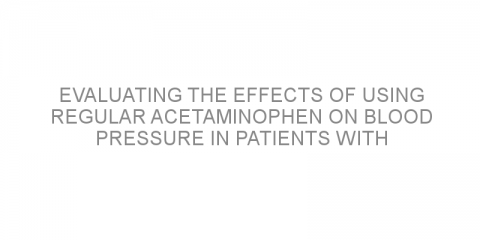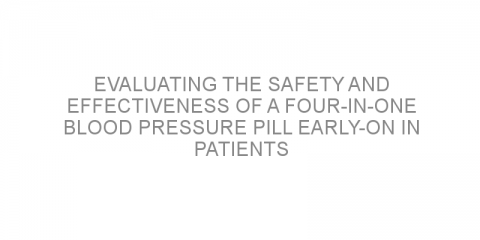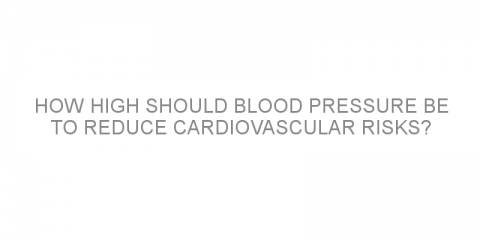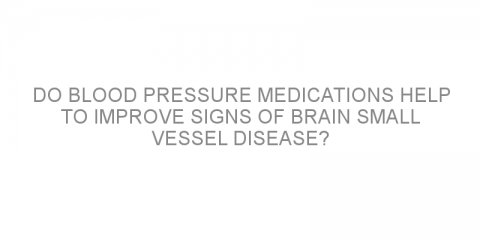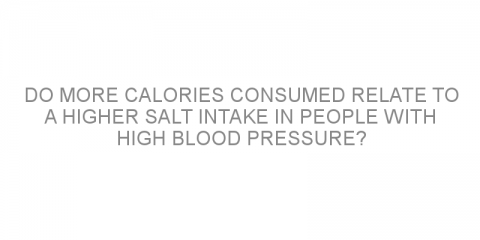In a nutshell This study evaluated the long-term relationship between bariatric surgery (BS; weight loss surgery) and major adverse cardiovascular events (MACE) in patients with obesity, diabetes, and hypertension (high blood pressure; BP). The study showed that a sustained decrease in MACE occurrence was associated with BS in these patients. Some...
Read MoreHypertension Posts on Medivizor
Evaluating the effects of using regular acetaminophen on blood pressure in patients with hypertension.
In a nutshell This study evaluated the effects of using regular acetaminophen (Paracetamol) on blood pressure (BP) in patients with hypertension (high BP). The data showed that regular daily acetaminophen use increased BP in these patients and increased the risk of cardiovascular disease when compared with placebo. Some background Hypertension or high...
Read MoreDo combination therapies given in fixed-doses polypills with aspirin reduce the risk of cardiovascular disease events?
In a nutshell This study investigated whether a combination pill given in fixed doses with or without aspirin can reduce the risk of cardiovascular disease events in patients without a previous history of cardiovascular disease. The data showed that a fixed-dose combination treatment strategy with aspirin significantly reduced the risks of...
Read MoreEvaluating the safety and effectiveness of a four-in-one blood pressure pill early-on in patients with hypertension.
In a nutshell This study investigated whether a single blood pressure (BP) pill containing 4 drugs (quadpill) at quarter doses is more effective than the standard dose of a single drug as initial treatment in patients with hypertension. The data showed that a quadpill was safe and more effective in getting BP under control than the standard...
Read MoreLifestyle changes for patients with high blood pressure resistant to medications
In a nutshell This study looked at the effects of diet and lifestyle changes for people with high blood pressure who did not respond to medication. It found that a four-month counseling program led to significant improvement in diet and exercise, blood pressure, and heart health. Some background Uncontrolled high blood pressure leads to cardiovascular...
Read MoreCan a salt substitute reduce the risk of a stroke and heart events in patients with high blood pressure?
In a nutshell This study investigated if a salt substitute could reduce the risk of stroke and cardiovascular (CV) events in patients with hypertension (high blood pressure). The data showed that the salt substitute reduced the risks of stroke, major CV events, and death from any cause compared to regular salt in patients with hypertension. Some...
Read MoreHow high should blood pressure be to reduce cardiovascular risks?
In a nutshell This study evaluated the optimal targets of blood pressure (BP) in older patients. It found that lowering systolic BP (SBP; BP when the heart beats) to 110-130 mmHg resulted in a lower risk of heart attack, stroke, or death compared to maintaining an SBP of 130-150 mmHg. Some background High blood pressure is a...
Read MoreIs fimasartan a safe and effective blood-pressure lowering treatment for older patients?
In a nutshell This study compared the safety and effectiveness of fimasartan (Kanarb) and perindopril (Coversyl Arginine) for the treatment of high blood pressure (BP) in older patients. It found that fimasartan was associated with better BP control compared to perindopril. Some background There are many different...
Read MoreDo blood pressure medications help to improve signs of brain small vessel disease?
In a nutshell This study looked at the effect of blood pressure (BP)-lowering medications on cerebral small vessel disease (CVSD). It found that maintaining systolic blood pressure (SBP; BP when the heart beats) between 110-129 mmHg reduced the progression of white matter hyperdensities, one of the signs of CVSD on brain scans. Some background...
Read MoreDo more calories consumed relate to a higher salt intake in people with high blood pressure?
In a nutshell This study looked at the association between the number of calories a person eats and the amount of salt consumed in people with high blood pressure. They found that people with increased weight and high blood pressure had a higher level of salt consumption. Some background High salt consumption is known to be linked to...
Read MoreCan blood pressure lowering medications reduce the risk of major cardiovascular events?
In a nutshell This study looked at the use of blood pressure (BP)-lowering medications in patients with normal to high blood pressure and its effect in preventing major cardiovascular events (MACE). It found that lowering BP led to a reduction in the risk of heart attack, stroke, or death in all patients, regardless of their pre-treatment...
Read MoreIs renal denervation effective for patients with hypertension resistant to a triple pill therapy?
In a nutshell This study looked at the use of renal denervation in patients with true resistant hypertension. It found that this procedure reduced blood pressure compared to medicine alone. Some background High blood pressure (BP) which is not controlled on three blood pressure-lowering medications including a diuretic (water pill) is...
Read More

